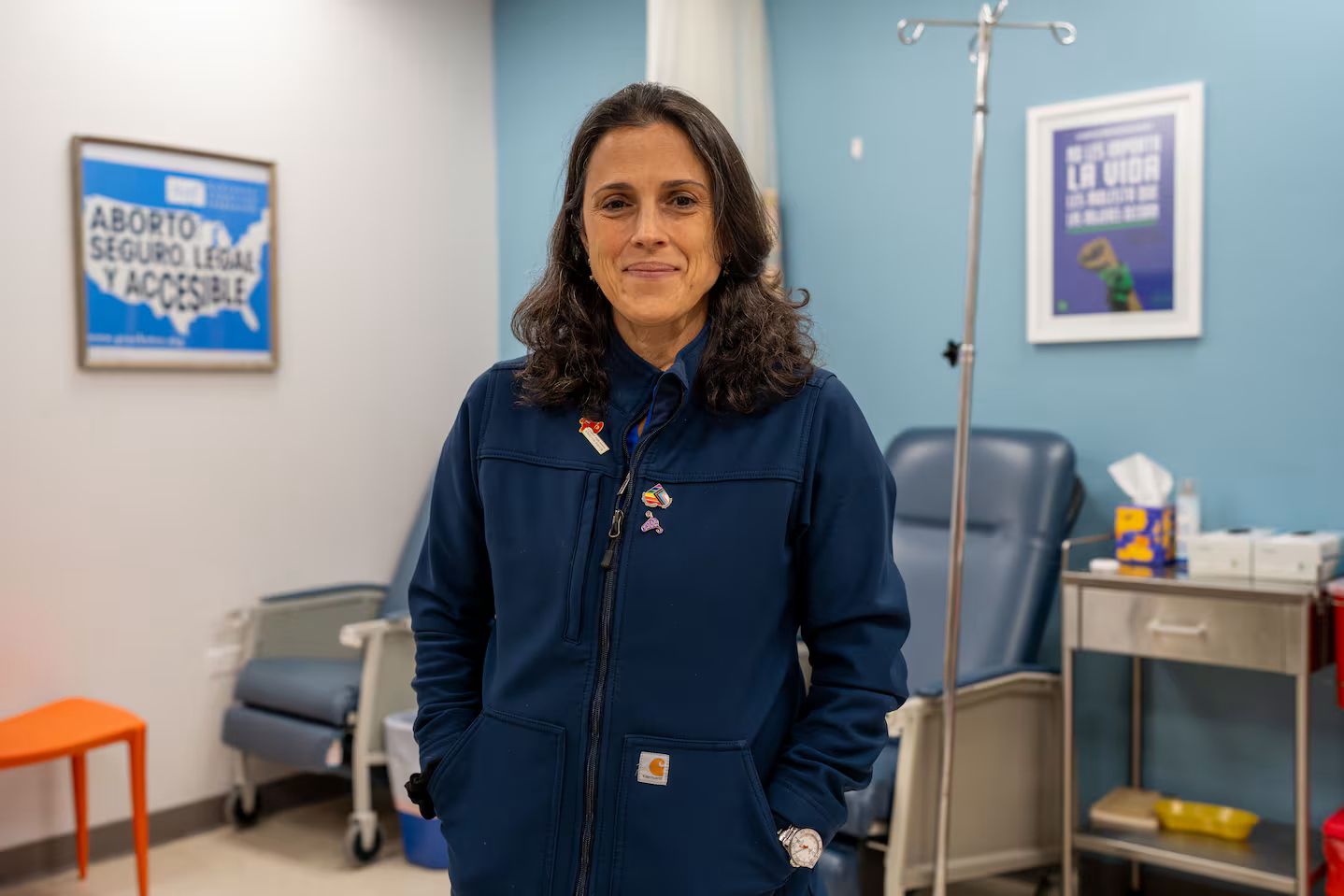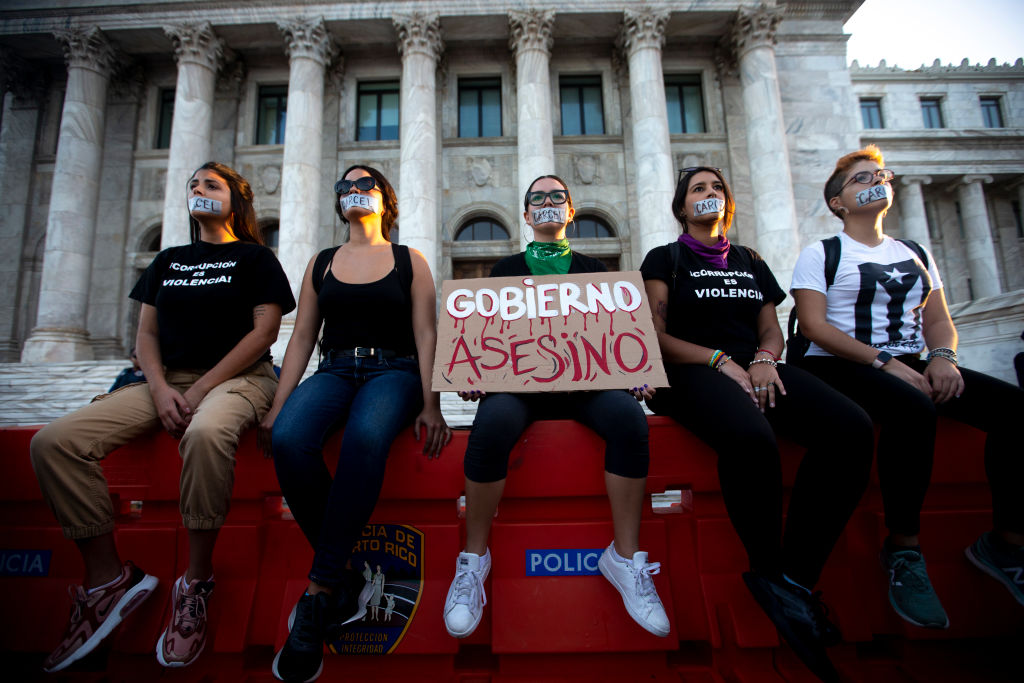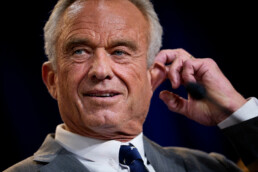Is the Last Abortion Haven in the Caribbean Closing?
How U.S. influence has been quietly reshaping access in Puerto Rico
By Susanne Ramirez de Arellano
Dr. Yari Vale's petite frame is no longer weighed down by the nine-pound bulletproof vest she wore when anti-abortion threats increased after the end of Roe v. Wade, but she hasn't gotten rid of it. The security guard at Dr. Vale's Darlington Medical Associates clinic in Río Piedras is no longer at the door; still, she has him on standby. With the return of Donald Trump to the White House and Jenniffer González, a Trump devotee, in the governor’s seat, Dr. Vale is bracing for an escalation in the fight to safeguard reproductive rights in Puerto Rico.
The predominantly Catholic island is “on paper one of the most accessible places in the Western Hemisphere” to obtain an abortion, NPR reported just after Roe was overturned. But with the U.S.'s shift toward right-wing Christian nationalism, that could be changing.
Dr. Vale, an OB/GYN at the Darlington clinic—the only one of the island's four that does late-term abortions—is on the frontline of the fight to keep what’s happening in the United States from happening in Puerto Rico, euphemistically called an unincorporated territory (it's a colony, really). It's a battle that, she says, feels like “throwing a firecracker up in the air, and it's just smoke and no one hears you.” But she persists, knowing that the first line of defense is the clinics.

The Legacy of Pueblo v. Duarte
For years, Puerto Rico has been known for its liberal abortion laws: The right is enshrined in the island’s constitution (which exists separately from the U.S. Constitution) and is protected by the right to intimacy under Puerto Rico’s penal code. Abortion is legal on request if it is performed (or prescribed) by a physician to protect the pregnant woman’s life or health—and health includes mental health. There are no limits (abortion may not be banned before viability; post-viability abortions are permitted for the preservation of the pregnant person), and the procedure doesn't require the consent of partners, ex-partners, or, in the case of minors, parents.
However, these laws have their roots in a dark colonial history. In 1902, four years after invading the island, the U.S. enacted policies to control the population, although abortion was still prohibited without exception. Then, in 1937, colonialists who wanted to further limit the Puerto Rican population passed legislation based on racist neo-Malthusian and eugenic theories, virtually legalizing abortion on the island if it was to protect the life and health of the patient. These changes later facilitated clinical trials of the contraceptive pill and mass coerced sterilizations—a procedure that became so common that it was known among Puerto Rican women as “la operacion.”
In 1980, a case involving a minor and her doctor went even further, and set up modern abortion law in Puerto Rico. In the landmark Pueblo v. Duarte, Dr. Pablo Duarte Mendoza, who had performed an abortion on a 16-year-old girl in her first trimester, was sentenced to four years in prison. He appealed, and the Puerto Rican Supreme Court agreed with him, stating that through the island’s penal code, abortion is legal if it is performed to save the woman's life or health, including mental well-being.
Like many things on an island impacted by colonialism, abortion access is still limited for everyday Puerto Ricans. A surgical abortion costs $250, and a medication abortion between $300 and $350; meanwhile, about 43% of Puerto Ricans live below the poverty line, and insurance plans on the island do not cover abortion. And in addition to cost, religion and social stigma—the “what-will-my-family-say” factor—serve as deterrents for many women.
The Dobbs Effect
When 2022’s Dobbs v. Jackson Women’s Health Organization decision removed the constitutional right to an abortion in the U.S., it didn’t automatically affect rights in Puerto Rico (unlike on the mainland, where “trigger bans” were in place). In fact, some U.S. women began to travel to Puerto Rico from states with restrictive abortion laws, such as Florida. It was the return of the “San Juan holiday.”

But Dobbs did embolden conservative Puerto Rican politicians and pro-life groups, who saw a window of opportunity and seized it. Shortly after the decision, the right-wing religious party Proyecto Dignidad (PD) adopted the U.S. anti-abortion lobby's blueprint and tried to push through several bills to curtail access to abortion, and even criminalize it. They argued that the end of Roe implicitly negated Pueblo v. Duarte. The Senate ultimately defeated the bills; according to many Puerto Rican legal experts, Pueblo v. Duarte rests on the Puerto Rican penal code, which has no analogy in the U.S. Constitution—and should, therefore, not be affected by Dobbs.
An Ascendant Right-Wing Movement
Abortion-rights advocates warn that efforts to criminalize abortion in Puerto Rico are not over. Traditionally, “the issue of abortion in Puerto Rico has not been the overriding controversy that the anti-abortion and ultra-religious politicians want to make it out to be now,” says Senator Maria de Lourdes Santiago, a lawyer and Senator for the Puerto Rican Independence Party (PIP). But, she says, the anti-abortion campaign orchestrated by Proyecto Dignidad now "magnifies the issue to demonize it."
Founded in 2019, PD has capitalized on its nexus of Catholic and Evangelical churches; the erosion of the traditional duopoly of the pro-statehood New Progressive Party (PNP) and the Popular Democratic Party (PPD); and an increasingly ultra-conservative sector of the population urging a return to traditional values. Even though the party got only seven percent of the vote in the 2024 elections, its influence is strong island-wide, with a campaign that now hinges on the abortion issue.
Proyecto Dignidad Senator Joan Rodriguez Veve, a canon lawyer and face of the populist religious right, has vowed to continue fighting to restrict access to abortion. She recently introduced legislation, PS 297, restricting access to abortion for adolescents under the age of 15. The bill is a carbon copy of one that the Puerto Rican House rejected a year ago. It calls for jail time for any doctor or person who assists a minor in getting an abortion, and a slew of other measures, including forensic interviews of minors seeking an abortion.
The Senate approved the bill in February, and almost everyone I spoke to—politicians, legal experts, and abortion doctors—told me they believe it will pass, even though both pro-abortion and some anti-abortion groups have, for different reasons, voiced their opposition to the measure.
A New Generation Stands Up

At the same time that PD is gaining influence, attitudes about abortion are shifting with the younger generation. Rising numbers of people support abortion rights, and young people have galvanized around the issue, taking to the streets in protest and amplifying groups like Aborto Libre Puerto Rico, Profamilias, and Proyecto Matria, among others. It’s a generation that, unlike its mainland counterpart, grew up without a sense of abortion as a wedge issue.
Most recently, health professionals and activists have spoken out against PS 297, warning that the bill puts women and girls in danger. “What's going to happen here is that young women and those most vulnerable will seek out illegal abortions and go to the places where illegal drugs are sold to purchase abortion pills, many cut with fentanyl, in doses that are not recommended,” says Puerto Rican feminist activist Alondra Hernández Quiñones.
As religious and conservative groups gain traction in Puerto Rico, Dr. Vale worries that a girl of 15, whose parents are ultra-conservative and refuse to consent to her abortion (as the new legislation would require), would be forced into motherhood. Clinics like Darlington have stopped seeing patients younger than 15 at all, and Dr. Vale fears a future where abortion, currently a safe and regulated procedure, “will once again be a public health problem…where we don't know how many women end up in emergency rooms due to an [unregulated] abortion gone wrong.”
“This worries me a lot,” says Isharedmie Vazquez, a 17-year-old Puerto Rican student. “It seems incredibly wild to me that instead of guaranteeing secure options [for an abortion], what they are looking for is to criminalize it and force women to assume a responsibility for which they are not prepared. It's unfair that they want to take away the right to decide about our lives.”
 Susanne Ramírez de Arellano is an author on race and diversity, opinion writer, and cultural critic. The former news director of Univision, she writes for NBC News Think, Latino Rebels, and Nuestros Stories, among other outlets.
Susanne Ramírez de Arellano is an author on race and diversity, opinion writer, and cultural critic. The former news director of Univision, she writes for NBC News Think, Latino Rebels, and Nuestros Stories, among other outlets.
American Moms Are Not Okay
 May 29, 2025 Bonjour, Meteor readers, The French Open is well underway, and my Belarusian princess Aryna Sabalenka is still going strong, as is the people’s champion, Coco Gauff. Gauff’s match is playing in the background as I type, and just watching how she moves across the clay is shredding my old-lady ACLs.  WOW LOOK AT THOSE KNEES. I BET THEY DON'T CRACK JUST FROM TRYING TO WALK UP THE STAIRS. (VIA GETTY) In today’s newsletter, Nona Willis Aronowitz reveals the reasons behind a sharp decline in moms’ mental health. Plus, your weekend reading list. Serving from my seat, Shannon Melero  WHAT'S GOING ONThe primal scream, now backed by data: If you have kids or spend time with people who do, you know that many moms are not okay. But a massive new study in the Journal of the American Medical Association puts data to vibes—and finds that mothers’ mental health is getting significantly worse. The study looks at self-reported survey results from nearly 200,000 parents from 2016 and then again in 2023. Over that time period, the percentage of mothers reporting that their mental health was “fair” or “poor” rose sharply, from one in 20 in 2016 to one in 12 by 2023. (Fathers did worse over time, too, but started in a far better place–in 2016, only one in 42 reported having “fair” or “poor” mental health, with one in 22 reporting the same in 2023.) As a pregnant mother of a young child, these results didn’t exactly shock me. In fact, the one-in-12-mothers-are-struggling felt low! Still, it’s worth asking why there’s been such a startling decline in only eight years (which started with Trump’s first term, jussayin’). Dr. Jamie Daw, assistant professor of health policy and management at Columbia Mailman School of Public Health and the lead author of the study, tells me there are myriad theories that have not yet been untangled–and that this trend pre-dates the parenting black-hole that was the pandemic. She points to economic factors like “inflation and income inequality” (while all socioeconomic groups experienced mental-health declines, single mothers and those with kids on Medicaid fared worst) but also moms’ “existential concerns like climate change, gun safety, and racism.” Dr. Daw also posits that the same “sense of isolation” that has become a national trend is hitting many mothers especially hard. More of them are feeling the impact of “weaker social support networks.” And yes, if you also clocked that 2016 lines up with a certain infamous election, that timing may be relevant: Dr. Daws says “it could be true that political polarization contributes to this reduced sense of community or even divisions among family members. There’s less social cohesion.” One more factor that could be driving these results? Less stigma around admitting that mothering is a Sisyphean task in America. Dr. Daw points out that these results are self-reported, meaning they’re “subjective and very influenced by norms and knowledge about mental health.” This, of course, doesn’t make them any less legit: “People’s own reflections on their mental health matter,” Dr. Daw says. “We want people to have the feeling that they’re thriving.” In any case, the study demonstrates the urgent need for what it calls “evidence-based policy interventions” for mothers (along with, I would add, non-policy interventions like more communal childrearing and dads getting off their asses). Things like free universal childcare, generous mandated maternity leave, and equal partnerships may not raise the birth rate, but they’d sure as hell make mothers’ lives better. —Nona Willis Aronowitz AND:
 CHIURI TAKING ONE FINAL STRUT DOWN A DIOR RUNWAY. (VIA GETTY)  WEEKEND READING 📚On starting motherhood alone: Noor Abdalla, a dentist and first-time mom, has survived her first month as a single parent. Her husband, the detained student activist Mahmoud Khalil, has only been allowed to hold his son once. (The Cut) On following the money: Foundations are pulling funds from reproductive justice groups speaking out for Gaza. Renee Bracey Sherman explains the real cost. (Prism) On paid and unpaid care work: Tracy Clark-Flory spoke with artist Kim Ye on how her work as a Domme helped her create a more equitable domestic dynamic. (Tracy Clark-Flory’s Substack)  FOLLOW THE METEOR Thank you for reading The Meteor! Got this from a friend?
|
![]()
UK Cops Take an Interest in Miscarriages
 May 22, 2025 Greetings, Meteor readers, Today’s date is a numeric palindrome, and something about that is just so utterly satisfying. I hope writing out 5/22/25 multiple times today was as good for you as it was for me. In today’s newsletter, we take a trip across the pond and examine the UK’s guidance on how police officers should investigate women after pregnancy loss. Plus, your weekend reading list. 52225, Shannon Melero  WHAT'S GOING ONABCAN (All British cops are nosy): Earlier this week, the UK’s National Police Chiefs’ Council (NPCC) released new guidance on how officers should investigate stillbirths, “unlawful termination,” and infant deaths immediately after birth. Part of the guidance–which, according to the Observer, was apparently issued without consulting any legal experts or doctors–states that if officers suspect an illegal abortion has taken place, they should seize devices and look through women’s internet histories, including their fertility trackers and Google searches. In other words: Even if you have a spontaneous miscarriage in the UK, police can search your belongings and phone for evidence of abortion. “The new guidance is shocking,” Dr. Ranee Thakar, president of the Royal College of Obstetricians and Gynaecologists (RCOG), told the Observer. “Women in these circumstances have a right to compassionate care and to have their dignity and privacy respected, not to have their homes, phones, computers, and health apps searched, or be arrested and interrogated.” This is all the more startling when you consider that abortion is legal in the UK—up to 24 weeks, with some allowances for later-term abortions if the life of the mother is at risk. The term limits for taking abortion medication at home are much shorter, and that is only legal up to 10 weeks, leaving any women who self-manage an abortion beyond that period subject to investigation. The NPCC is defending the new guidance, claiming that searches will only be conducted if there is a credible belief that a crime has taken place and that it’s not routine to launch an investigation after pregnancy loss. Still, investigations like these are on the rise. Last year, the BBC found “an unprecedented number of women” were being investigated on suspicion of unlawful abortion; six women in the UK have been prosecuted for abortion-related charges in the last couple of years, compared to only three reported convictions in the previous century and a half. Recent cases include that of Carla Foster, who was jailed after taking abortion pills after the legal timeline, and of Nicola Parker, who was unanimously acquitted of unlawfully inducing a miscarriage just weeks ago. So why this renewed interest in policing pregnancy loss in the UK? Blame us, or to be clearer, the U.S. These investigations have neatly coincided with the fall of Roe, and in January, the international charity MSI Reproductive Choices outlined how Trump’s re-election would further embolden anti-abortion politicians to push more misinformation and spend more on anti-abortion messaging. That prophecy was fulfilled a few weeks ago when conservative MPs in the UK started delaying and picking apart a bill introduced by the Labour Party to decriminalize abortion throughout the UK, all while a teenager, Sophie Harvey, was on trial for an illegal abortion. One Labour MP, Tonia Antoniazzi, thinks that even with the U.S.’s bad influence, the UK is poised to protect abortion. “I am confident that…my colleagues will agree that never again should a woman be prosecuted for ending her own pregnancy in England and Wales,” she told the BBC. (Another point in her favor: Nearly 90 percent of people in the UK are pro-choice.) A vote on two decriminalization amendments is expected to be held this summer. AND:
 WEEKEND READING 📚On unsolved mysteries: Roanoke College in Virginia has seen a surge in cancer cases over the last 17 years—disproportionately affecting women. What the heck is going on over there? (Airmail) On a water war: Climate change has disturbed rainfall patterns in the West Bank, which wouldn’t be such a problem if Israel weren’t also weaponizing water. (Atmos) On eternal youth: Sofia Coppola revisits The Virgin Suicides. (i-D)  FOLLOW THE METEOR Thank you for reading The Meteor! Got this from a friend?
|
![]()
Doctors Finally Admit IUDs Hurt
 May 21, 2025 Greetings, Meteor readers, Last Friday, I had the immense pleasure of seeing Real Women Have Curves on Broadway. In a world where people are being violently rounded up and inhumanely detained, it was reinvigorating to watch a story so steeped in Latinx culture and the resilience of immigrant women. I laughed, I cried, I developed a crush on Claudia Mulet, and I vowed to be louder about the injustices of our anti-immigrant regime.  IF ALL THESE WOMEN DON'T GET TONYS, I WILL RIOT IN THE STREETS. (VIA GETTY IMAGES) In today’s non-musical-theater news, we explain the latest “discovery” about IUD insertion. Plus, a new law banning revenge porn is finally on the books. No soy de aquí, pero tu tampoco, Shannon Melero  WHAT'S GOING ONBetter late than never: The American College of Obstetricians and Gynecologists (ACOG) has released new recommendations around cervical and uterine procedures, most notably IUD insertion. On the heels of similar guidance released by the CDC last year, ACOG has discovered not only that IUD insertion can be excruciatingly painful to patients, but that there is an “urgent need” for clinicians to offer pain management. Sorta like when Columbus discovered America. And by that, I mean many of us were already here. Women have been complaining about the pain caused by IUD insertions for years, and the people doing the inserting famously underestimate it; one study from 2014 found that while doctors were rating the pain of IUD insertion a 35 out of 100, patients ranked it at more like 65. This probably comes as no surprise to anyone who has either visited a gynecologist or been on the internet: Women’s pain, particularly around reproductive health, is often dismissed as either exaggerated or simply part and parcel of ✨being a woman✨. Think Serena Williams nearly dying in childbirth after her pain was ignored, or the women at the Yale fertility clinic who were unwittingly undergoing egg retrievals without pain relief and told their agony was normal. Unlike the CDC recommendation, ACOG also recommends pain management for a variety of procedures like endometrial biopsy, polypectomy, hysteroscopy, and certain kinds of imaging. And ACOG acknowledges structural inequities: “The way pain is understood and managed by health-care professionals is also affected by systemic racism and bias of how pain is experienced,” its findings note. “Historically, Black patients have received less analgesics than white patients, and women have received less attention to their pain than men undergoing similar procedures.” This change, of course, does not guarantee painless IUD insertions; there’s only so much lidocaine can do. But the guidance is important because it encourages doctors to have conversations they might have once deemed unnecessary, including ones around anxiety that patients might feel about undergoing some procedures (anxiety which ACOG suggests can be addressed with medication). As someone who was prescribed Xanax to make it through a dental procedure, I think it’s wild that stronger medications aren’t regularly offered when someone burrows a medical device up your cervix. So if you’ve got an appointment coming up, be vocal! We’ve already suffered enough–we deserve the good drugs. AND:
 REGINA VENTURA OUTSIDE OF THE COURTHOUSE. (GETTY IMAGES)
 CLARK AND REESE MEETING AT MID-COURT AHEAD OF THE GAME AND THE FOUL HEARD ROUND THE WORLD. (VIA GETTY IMAGES)
 FOLLOW THE METEOR Thank you for reading The Meteor! Got this from a friend?
|
![]()
Running, Walking, Crawling for Justice
 May 15, 2025 Greetings, Meteor readers, I had a delightful and tear-inducing conversation with a young woman today (read some of it below) that reminded me just how much many of us suffer in silence. If that’s you, please know: We hear you even if you’re whispering. In today’s newsletter, the clock is counting down on the Summer Willis Act, a Texas bill that could reshape the future for sexual assault survivors. Plus, a heartbreaking case in Georgia and your weekend reading list. For the quiet ones, Shannon Melero  WHAT'S GOING ONCodifying consent: In just about two weeks, the 89th Texas legislature will adjourn and will not return until January of 2027, meaning that any bills that aren’t voted on during this session will remain in limbo for two years. For Summer Willis–a Texas mom of two, endurance athlete, and fierce advocate for an anti-rape bill making its way through the State Senate–that’s two years too long. You may have heard of Summer Willis: She ran the course of the New York City marathon (on International Women’s Day) last year while carrying a mattress to raise awareness about sexual abuse. For her, it was personal: When Willis was a sophomore at University of Texas-Austin in 2014, she says, she was drugged and raped at a frat party. She didn’t go to the police or school at the time. But later, she learned that what had happened to her was not even classified as rape because of the murkiness of Texas’s sexual assault law. Because one person had given her a spiked drink and a different man raped her, she says, the latter could not be tried since he didn’t “voluntarily intoxicate” her. The lack of legal clarity around consent means that many assaults, especially ones committed on college campuses, effectively disappear. “My rape is not considered rape in Texas right now,” Willis says. “Neither are the [rapes of] thousands of Texans.” She tried to bury the trauma until two years ago, shortly after the birth of her second child. In the thick of postpartum, she says she looked her boys in the eyes and said, “I promise y'all I will try to become the woman I used to believe I could be.” She took up running, believing that it would “make me strong and resilient and find all the answers I’ve been seeking for 10 years.” When she began sharing her story of survival with other runners and moms, she was shocked by how many of them relayed similar stories. “I was never planning on being an advocate,” she says. “But I just met too many survivors.”  WILLIS CROSSING TOWER BRIDGE AT THE LONDON MARATHON, WITH MORE JOY THAN ANYONE WOULD EXPECT FROM SOMEONE DOING THIS MUCH RUNNING. SUPER HUMAN. (COURTESY OF SUMMER WILLIS) In February, Willis crawled half the distance of the Austin Marathon and ran the rest, the starting point of her run just across the street from where she was assaulted. (She told Runner’s World that the crawl was a metaphor for the difficulty survivors face in the search for justice.) Afterward, HB 3073’s sponsors informed Willis they would be renaming the bill in her honor. If passed, the law would codify and provide a legal definition of consent, including a stipulation that there can be no consent if a victim is intoxicated or unaware an assault is happening. “I feel the weight of all survivors in Texas on my shoulders,” she says. Although Willis thinks simply defining consent is “not enough,” the bill “will finally tell so many survivors that their rape counts.” Although HB 3073 passed the House earlier this month with overwhelming bipartisan support and is (shockingly) a top priority of Texas Governor Greg Abbott’s sexual assault task force, the clock is ticking before the legislative session ends on June 2. So what can we do? Texans can contact their senators, and Willis says the two men who need to really feel the love for this bill are Mike Ward (R-TX) and Pete Flores (R-TX). You can also find resources and follow Willis’ work by supporting her organization, Strength Through Strides. AND:
  WEEKEND READING 📚On going when you need to: One trans man spent a lifetime avoiding public bathrooms, damaging his bladder in the process. But now he’s finally ready to stop holding it all in. (Cosmopolitan) On the “magic pill”: For some–especially pregnant people–the anti-nausea medication Zofran is a lifesaver. So why isn’t this safe, quick, effective drug sold over the counter? (The Cut) On inherited worries: “At thirty-six, I have never been sweeter, smarter, or hotter than I am now.” Angelica Jade Bastién has a message for women already flagellating themselves over aging. (Madwomen & Muses)  FOLLOW THE METEOR Thank you for reading The Meteor! Got this from a friend?
|
![]()
Moms Don't Need Jobs, Right?
 May 13, 2025 Hey there, Meteor readers, I don’t know about the rest of y’all New Yorkers, but it has been extremely tense in my house as the Knicks take my entire family on an emotional journey through the playoffs. Peace be with the fans.  YOU JUST KNOW THIS MAN'S BLOOD PRESSURE IS OFF THE CHARTS. (VIA GETTY IMAGES) In today’s newsletter, we’re taking a look at the GOP's obsession with stay-at-home moms. Plus, three questions on wellness with writer Amy Larocca. Knicks in five, Shannon Melero  WHAT'S GOING ONFrom WAHM to SAHM: Last month, we wrote about Trump’s pro-natalist plans to solve the declining birth rate in the U.S., which pretty much added up to, Here’s a little extra money and a medal, have some more kids. No, thanks! But, not one to let a bad idea go, the GOP is tackling the issue from an incredibly old angle: encouraging more stay-at-home parents (more than 80 percent of whom are moms). Instead of investing in federally funded childcare, the administration has proposed cuts to Head Start and fired hundreds of workers at the offices of Child Support Services, Child Care, and Family Assistance. Conservatives claim these moves don’t contradict their natalist stance; they merely want to encourage parents to spend more time with their children. Republicans in Congress have proposed expanding child tax credits to help parents afford to stay home, eliminating daycare tax breaks, and offering new credits to families that use relatives as caregivers—all solutions designed to, as Sen. Josh Hawley (R-MO) put it to the New York Times, “give parents the opportunity to…actually raise [their] kids.” So what’s wrong with that? First, Hawley’s assertion that parents who send their children to daycare are not actually raising them would be laughable if it weren’t so infuriating. Daycare employees are providing a structural and educational foundation for children that, frankly, many parents don’t feel equipped to offer, even if they were given a $5,000 tax credit. Would that money go a long way toward helping some families? Absolutely. Would it be enough to allow one parent to quit their job? No, and I cannot emphasize this enough, fucking way. And then there’s the basic assumption underlying these policies: that, as conservatives have argued for years, children who stay home with mom flourish more than those who do not. There is no definitive study that proves that to be the case; other factors like poverty and food insecurity are far more relevant to whether kids will thrive. The fact that Republicans aren’t even pretending to address those factors is incredibly telling. They aren’t interested in supporting families’ childcare choices. They’re certainly not interested in making sure impoverished children have access to resources. But they are interested in pressuring mothers–especially ones who can afford it, with or without a tax credit–to get out of the office and go back to being barefoot and pregnant. AND:
 ÖZTÜRK AT A PRESS CONFERENCE FOLLOWING HER RELEASE. (VIA GETTY IMAGES)
 YOU CAN VISIT "GROUNDED IN THE STARS" THROUGH JUNE 17. (GETTY IMAGES)  Three Questions About...WellnessAmy Larocca, author of a big new book on the industry, separates the harmless from the hoaxesBy Cindi Leive  AMY LAROCCA (COURTESY OF PENGUIN RANDOM HOUSE) One of the many developments of the last decade—along with the rise of AI, Trumpism and tradwives—is the vast and varied world known as “wellness,” which includes everything from that meditation app on your phone to billion-dollar biohacking. Journalist Amy Larocca has spent seven years making sense of it all, and her book, How to Be Well: Navigating our Self-Care Epidemic, One Dubious Cure at a Time, is out today. Despite its skeptical subtitle, Larocca understands that “wellness culture is too big for us to be either completely for or against it.” So where did she land? I wanted to know. Your book investigates the recent rise of wellness culture. But back in the ‘80s, there were grapefruit diets and aerobics classes and all kinds of physical expectations. What’s different now? A lot of it in the ‘80s was about looking good, or slimness—I can still picture the Dexatrim box! But there wasn't a lot of thought about health in mainstream culture. I really started to notice the rise in wellness culture when I was working as a fashion editor [at New York Magazine in the 00s-10s]. Fashion was becoming more democratic—you could stream the shows, you could shop online. But at the same time, health was becoming more and more expensive and out of reach. Basic healthcare was not being treated as a right in the United States, but as a luxury commodity. And I could see that it was being marketed using all of the same language as the fashion industry that I'd been covering. And how weird is it that the new luxury good is our health, something that isn't extra, right? A handbag or a pair of shoes or a lipstick is something that's extra, but our health shouldn't be extra. You started writing this book seven years ago—when, yes, there were colonics and juice cleanses, but you could still go to the CDC for solid information about what worked or didn’t. Now our top public health leaders are trafficking in disproven myths about vaccines and cancer and birth control and fluoride. Did you see this coming? I feared that it would get as bad as it has gotten. And one of the reasons that wellness culture has been able to rise in the way that it has, especially for women, is there's a real absence of experts. The writer Maya Dusenbery [has] said that it drives her crazy when women seeking wellness care are described as seeking “alternative solutions.” Because these aren't alternatives: We don't really have other choices! Women are going online looking for advice from other women for managing their autoimmune conditions because autoimmune disease and other diseases that have disproportionately affected women have been very underfunded and understudied. So when women are using this relatively new resource called the internet to speak to each other and discuss what has worked for them and how they've managed—that's not alternative. That's just us actually trying to find some relief because the mainstream channels have let us down. [And] given the current political situation, I don't see that getting any better. Your book makes it really clear that progress and bullshit are really intertwined in wellness. Meditation is incredibly helpful to a lot of people and it’s being oversold as a solution. Our health-care system does need to focus more on menopause and there’s now a lot of menopause-related crap being sold to us with cutesy names. So is there a wellness development that you find really promising, and one that feels particularly BS-laden at the moment? For years, there was a conversation about [hormone replacement therapy] being very, very, very dangerous for women, so women stopped taking HRT. Then NAMS re-released its research and talked about HRT being safe for women—that coincided with the rise of telehealth [in COVID] and suddenly you had a number of telehealth startups making HRT very, very, very easily accessible. So you combine all that in a perfect storm and you get a lot of women with very high expectations for what HRT is going to be able to do for them during perimenopause—and all this is doing exactly what wellness culture has the potential to do in the worst possible way: It oversimplifies matters with a profit motive behind it all. The real story of HRT is: Here's a treatment that can help some women with some symptoms some of the time, but the only narratives that seem to gain any traction are “It will kill you!” or “It will save you, hurl down your crutches, Oh Lord, I can walk!” And neither of those stories seem to me to be the correct story of HRT, but no one seems to have any tolerance for anything in the middle. Part of that seems to be driven by how much money there is to be made. Part of it seems to be driven by the appetite for a good story. Part of it seems to be driven by a lack of patience for complexity, and how boring medicine can actually be. But it really started to freak me out—the expectations that people seemed to start having for what HRT was going to do for them, and the amount of money that a number of business people were excited to suddenly make. And that's wellness culture in a nutshell. I’m breaking the rules of this column with a fourth question. Is there one particular wellness habit you've picked up while writing the book that you will keep? Breathing. It’s free. I do 4-7-8 breathing. I'm big on all the free stuff: I walk everywhere, and I sleep. Sleep as much as you possibly can, and never, ever, ever feel guilty for going to bed.  FOLLOW THE METEOR Thank you for reading The Meteor! Got this from a friend?
|
![]()
Is “Divine Intuition” a Health Fix?
 May 8, 2025
Greetings, Meteor readers, It’s my daughter’s third birthday this weekend, and she has requested–in her exact words—“a pink beautiful sparkly glittery jewel-y dress” so she can look “extra-princess-y!!!” It really does start this young, y’all. Time for me to revisit Peggy Orenstein’s Cinderella Ate My Daughter. Today we’re digging into Trump’s new and disconcerting pick for Surgeon General. Plus, a new (American!) pope, and an interview with author Amanda Hess about how technology mediates our experience of pregnancy and motherhood. Happy sparkly Mother’s Day to me, Nona Willis Aronowitz  WHAT'S GOING ONThe wellness-to-MAGA pipeline: Did you think the stream of horrifying Trump nominees was over? Not quite. Yesterday, President Trump announced that he was withdrawing his pick for Surgeon General, Dr. Janette Nesheiwat, and replacing her with far-right wellness influencer Dr. Casey Means. In his announcement, Trump praised Dr. Means by touting her “impeccable ‘MAHA’ credentials,” and he isn’t wrong: The nominee and her brother, former lobbyist Calley Means, are vocal allies of Health and Human Services secretary Robert F. Kennedy, Jr. and were close advisors during his 2024 presidential bid. But here’s the real issue: Dr. Means–who has an inactive medical license and dropped out of her surgical residency program–regularly expresses skepticism of mainstream medicine, including vaccines, fluoride, raw milk bans, and birth control, which she has called a “disrespect for life.” (In fact, she’s become the nominee because her predecessor, Nesheiwat, had been targeted by Trump confidant Laura Loomer and other far-right activists for praising the COVID vaccines.) She frequently casts doubt on the value of science itself: “Of COURSE we should trust our heart intelligence and divine intuition instead of BLINDLY trusting ‘the science,’” Dr. Means wrote in an Instagram post last year. Putting “science” in scare quotes…not exactly a reassuring sign.  It remains to be seen whether Dr. Means will be confirmed by the Senate; Trump’s nomination of Dave Weldon for CDC head was jettisoned after concerns over Weldon’s claims that vaccines cause autism. (They don’t.) But assuming she does get the job, the question becomes: What do Surgeon Generals actually do? They aren’t directly involved in implementing health policy, but they can often set the government’s priorities. C. Everett Coop, Ronald Reagan’s Surgeon General, was famously influential in changing the public’s view on smoking and, according to the New York Times, “single-handedly pushed the government into taking a more aggressive stand against AIDS.” Some have tried pushing the limits: When Surgeon General Joycelyn Elders gave the thumbs up to masturbation and encouraged Americans to “get over their love affair of the fetus and start worrying about children,” President Bill Clinton fired her. More recently, President Joe Biden’s Surgeon General, Vivek Murthy, made waves when he called for a warning label on social media. In other words: Surgeon Generals don’t make laws, but they are a major source of information and influence, which makes Dr. Means’ nomination all the more worrying. Will she further legitimize vaccine skepticism and accelerate measles outbreaks? Will she give a boost to raw milk amid a bird flu epidemic? Will she stigmatize birth control at a time when it’s already under attack? Time to once again call your senators; here’s a useful script from 5Calls. AND:
 POPE LEO AT HIS PREDECESSOR’S FUNERAL LAST MONTH. VIA GETTY IMAGES
  Three Questions About….Modern MotherhoodAmanda Hess’s new memoir interrogates how technology changes the experience of early parenting and pregnancy.From the moment her period app detected she was pregnant, journalist Amanda Hess experienced motherhood through the prism of her phone, from chirpy pregnancy apps to momfluencers on Instagram. Then, at 29 weeks pregnant, her son was diagnosed with a rare genetic condition called Beckwith-Wiedmann Syndrome, and everything changed. In her new memoir, Second Life, she grapples with deeply held assumptions–both society’s and her own–about normalcy, public performance, and disability. Let’s talk about that pivotal moment when your son is diagnosed with BWS. Can you describe some ways the diagnosis changed you? I did not realize to what extent I had absorbed all of these cultural messages about what pregnancy, motherhood, and babies are supposed to be like. For such a long time, I didn’t even care about whether or not I became a mom. But when I became pregnant, I wanted to make sure I wasn’t messing it up. I internalized this idea that it’s a woman’s job to reproduce healthy, normal, productive citizens–although I never would have put it that way. I was going to these sites and apps not even for advice–I didn’t do most of the stuff they suggested–but more to understand the role I was expected to play, even if I wasn’t necessarily complying. And then when my child was diagnosed late in my pregnancy, it struck me as a tragic thing to happen, as a crisis. Most pregnancy technology is geared toward a “normal” pregnancy, so the moment there was the slightest deviation in my pregnancy, I was out of the “normal” zone and initially felt very abandoned. It was only after my son was put in this human context, after he was born, that I could see him as my son and not a medical idea. And ironically, the internet helped with this: I found some other, helpful online communities–ones that were comprised of real human beings who were convening around BWS (as opposed to some app that only knew my due date and nothing else about me). As you mention in the book, pregnancy has long been a site of state surveillance, but that fact feels even more true lately. Does your research take on a more sinister cast in an era when pregnancy is increasingly criminalized? Yes, there is this ramping up on pregnancy surveillance and also surveillance of people with disabilities. Our medical information is seemingly being seized by government workers we don’t even know. What’s clarifying is that even as it’s changing technological shape, the ideologies are really similar to eugenic [and pro-natalist] thinking that were in vogue 100 years ago. I think we need to balance the new threats–the way all of our data can be scraped by young programmers who are working for Elon Musk–with the knowledge that [throughout American history] our doctors and hospitals have been giving up pregnant people’s information and long been using it to criminalize pregnancy and remove their children. Still, I do have more specific fears for my actual family than I did before. My book talks about how protective wealth and status and whiteness can be in these situations, but the intensity of surveillance now on anyone who has any kind of difference is at a new level, and it really implicates my family. One of the most absorbing parts of the book is when you talk about your obsession with the free-birthing movement, where women give birth without any medical intervention or prenatal care. What was so intriguing to you about them? On the one hand, our experiences of pregnancy could not be more different. My pregnancy ended up being intensely medically monitored: I gave birth in a specific hospital so we could have access to this higher-level NICU–which I came to see as such a blessing. This group of women were on the opposite extreme; many of them don’t get traditional prenatal care. But there were places where our two experiences overlapped. I had this overwhelming need to try to control the uncontrollable by deep-Googling medical information. With them, it was much more about these holistic practices like sunbathing or whatever, but we were both practicing these different modes of control. And those two practices and ideologies both have this tenuous relationship to disability. In this highly technological space I was in, I saw a lot of erasure of the reality of disability, and the assumption that you’d want to avoid it at all costs…[but] then there was this idea in the natural-birth communities that any medical care was unacceptably unnatural, and that some children are fated to die in the womb or at birth because it’s what God intended. Both are eugenic ideas, in their own ways.  WEEKEND READING 📚On the new normal: Everyone is cheating their way through college with ChatGPT, and professors have no idea what to do about it. (New York Magazine) On realism: Writer and illustrator Mona Chalabi explains how she created the hijabi mom character in the animated TV show #1 Happy Family USA. (The Guardian) On mifepristone: You may have been pleasantly surprised to hear that the Trump administration recently defended the abortion pill against a lawsuit. Don’t get too excited, warns law professor Mary Ziegler. (Slate) An earlier version of the headline contained an error; Dr. Means wrote of “divine intuition,” not “divine intervention.”  FOLLOW THE METEOR Thank you for reading The Meteor! Got this from a friend?
|
![]()
A Night of Black Creativity
 May 6, 2025 Hey there, Meteor readers, Hearty congratulations are in order for Meteor collective members Dawn Porter and Tanya Selvaratnam, both of whom are nominated for News and Documentary Emmys this year: Porter for The Sing Sing Chronicles and Documenting Police Use of Force; and Selvaratnam for Love to the Max. Watch if you haven’t! In today’s newsletter, we’re strolling down the blue carpet of last night’s Met Gala with Julianne Escobedo Shepherd—and taking a moment to celebrate midwives. Still thinking about this, Shannon Melero  WHAT'S GOING ON CARDI B AND HALLE BERRY. NO NOTES. (VIA GETTY IMAGES) Fashion’s dandiest night: Whatever your feelings about the Met Gala, this year’s theme, Superfine: Tailoring Black Style, was an important one. It was selected by Costume Institute curator Andrew Bolton last year after he read the 2009 book Slaves to Fashion: Black Dandyism and the Styling of Black Diasporic Identity, by Barnard professor Monica L. Miller, now chair of the college’s Africana Studies Department. Inspired by its deeply researched history of the way formerly enslaved Black people reclaimed the frippery they were forced to wear into their own distinct style, Bolton asked Miller to become the Costume Institute’s first guest curator in his ten-year tenure. The exhibit itself lasts for nearly half a year, long after the last bit of carpet is rolled up. Superfine looks at the lineage of Black style in “the Atlantic diaspora,” and cites Zora Neale Hurston’s “Characteristics of Negro Expression,” an essay from 1934. “The will to adorn is the second most notable characteristic in Negro expression,” Hurston wrote. “Perhaps his idea of ornament does not attempt to meet conventional standards, but it satisfies the soul of its creator.” In other words: Black fashion evolved as a form of resistance against the way white culture expects Black people to be, but it doesn’t matter whether the clothes please anyone but the wearer. Aesthetically speaking, this year contained the best fashion at the Gala in years, its “tailored for you” dress code encouraging attendees to show up and show out as themselves. Co-chair Teyana Taylor wore a long red cape embroidered with the words “Harlem Rose,” created by costume designer Ruth E. Carter, who in 2018 became the first Black woman to win an Oscar for Best Costume Design, for Black Panther. Rihanna donned a deconstructed suit—part jacket, part bustle, part waist-as-lapel—its regal pinstripes channeling the spirit of Ida B. Wells, assuredly strutting into her newspaper job at the New York Age in the 1890s.  DO WE THINK SHE'S HIDING R9 UNDER THAT HAT? (VIA GETTY IMAGES) While the glitter of the Met Gala may seem out of touch in these violent times, it feels significant that Black creativity was celebrated at such a major institutional event, in a moment when institutions are being all but purged of Black people and other people of color. We’ve already seen how the Trump administration’s blatantly white supremacist agenda has affected the Kennedy Center, all cabinet-level departments, and state universities; he has promised to next come for the Smithsonian’s National Museum of African American History and Culture, PBS, and other government-funded institutions that bring alive the history of Black and brown people. Those institutions have only just begun to help this country grapple with its historical atrocities; now, thanks to the administration’s war on what it derisively refers to as “DEI,” the small progress that’s been made is being literally erased. Don’t just talk about it, be about it, goes a common phrase in African American Vernacular English (AAVE). The long national project of what that means politically is being cut off at the knees, thanks to these attacks on Black history in classrooms, libraries, government websites, and museums. So it’s huge that “fashion’s biggest night” at the country’s most renowned art institution was about Black history and Black people reveling in Black fashion as resistance. It was emphasized across every major publication, every tabloid and blog, and all over every social feed—Black fashion history everywhere. As Professor Miller put it to Lala Anthony in an interview on the carpet last night: “I’ve never had such a big classroom.” –Julianne Escobedo Shepherd AND:
  FOLLOW THE METEOR Thank you for reading The Meteor! Got this from a friend?
|
![]()
There's No "Fetus Debris" In Your Vaccine
 May 1, 2025 Howdy Meteor readers, A reminder that as of next Wednesday, you will need a REAL ID for air travel within the U.S. Why am I bothering with this PSA? Because it’s a pain in the ass: I wasted several hours of my own life at the motor vehicle commission, only to be told that the stacks of paperwork I brought were not enough to confirm my identity. Apparently, that’s a pretty common problem, especially for married women, so…best of luck out there. In today’s newsletter, we parse through the most dangerous medical lies of the week. Plus, a long overdue honor is bestowed, and your weekend reading list. Standard ID girlie, Shannon Melero  WHAT'S GOING ONPure malarkey: 👏🏼Stop 👏🏼spreading 👏🏼misinformation 👏🏼about 👏🏼 our 👏🏼health. This week, two major instances of misinformation made the rounds. First up is Secretary of Health and Human Services Robert F. Kennedy, Jr.’s claim that MMR (measles, mumps, and rubella) vaccines contain “aborted fetus debris.” To be clear: These vaccines do not, at all, contain parts of fetuses or fetal cells. What he is referring to is the widely accepted and longstanding use of fetal cells to develop vaccines, which involves introducing a virus or bacterium to human cells and then inactivating or killing the virus. The original fetal cells used to develop the vaccines we now rely on were harvested in the 1960s from two elective abortions. Like all cells, they’ve continued to multiply over the years, and scientists have been using the same line of cells for generations. But as the vaccine education center at the Children’s Hospital of Philadelphia explains, no vaccine injected into a person contains fetal cells. After the vaccine viruses are grown, the manufacturers “purify the vaccine viruses away from the cells.”  So why peddle this falsehood at all? RFK Jr. is a notorious flip-flopper on vaccines. One week, he supports them, the next he doesn't, but no matter what, he casts baseless doubt on their efficacy at every turn—even in the middle of a measles outbreak in Texas. What better way for a vaccine skeptic to dog-whistle conservative-leaning parents than to say there are dead babies floating in the vaccine liquid? (So far, two children have died in Texas as a result of the outbreak, which is two too many.) On to the next big lie of the week. A new “study” titled “The Abortion Pill Harms Women” was released by the conservative think tank Ethics and Public Policy Center, which advertises itself as “working to apply the riches of the Jewish and Christian traditions to contemporary questions of law.” I will not provide the link to the actual study because, as we’ve written before, we should not share links to false or misleading information for any reason. But that didn’t stop Fox News from doing this tomfoolery. Deep breath. Here are the facts: This “study” was not conducted by doctors, whereas the rigorous clinical testing for mifepristone’s FDA approval was conducted by multiple doctors over years. (We spoke to two of them last year.) Instead, it was compiled by data analysts reviewing health insurance claims. What they say they found by reviewing claims’ procedure codes is that nearly 11 percent of women who used mifepristone had at least “one serious adverse event” in the 45 days after taking the pill. But as journalist Jessica Valenti points out, the study does not provide evidence that the “serious adverse events” are directly caused by or even related to the use of mifepristone—they simply happened within 45 days of use. And these “serious adverse events” are loosely defined; for instance, according to Valenti, they include “hemorrhaging,” which could include the heavy bleeding that can be normal after a medication abortion. So why even talk about this “fart” of a study, as Valenti hilariously characterized it? Because it calls on the FDA to “further investigate the harm mifepristone causes to women,” on the grounds that the pill is “considerably more dangerous to women than is represented” on the label. Politicians have already started to parrot that narrative. The new FDA head, meanwhile, is anti-abortion. For the kabillionth time: Abortion pills are safe! AND:
 MAHDAWI AT A CAMPUS PROTEST IN 2023. (VIA GETTY IMAGES)
 LT. COLONEL ADAMS (FRONT LEFT), A MAJOR AT THIS TIME, WITH CAPTAIN MARY KEARNEY BEHIND HER AS THEY INSPECT THE FIRST RECRUITS TO THE 6888 IN 1945. (VIA GETTY IMAGES)  WEEKEND READING 📚On bad buys: Women are still learning about the dangers of multi-level marketing schemes the hard way. (The Cut) On childhood fame: Piper Rockelle, the kid-fluencer at the center of the Netflix documentary Bad Influence, finally breaks her silence. (Rolling Stone) On something you may have missed: This heartwarming, tear-inducing excerpt from Tina Knowles’ memoir, Matriarch. (Vogue)  FOLLOW THE METEOR Thank you for reading The Meteor! Got this from a friend?
|
![]()
The Longest 100 Days Ever
 April 29, 2025 Salutations, Meteor readers, Before we get into it today, exciting news: We’re going to the Tribeca Film Festival! This summer, you can catch the world premiere of Dear Ms.: A Revolution in Print; our very own Cindi Leive served as an executive producer. The film—from McGee Media in partnership with HBO—looks back on Ms. magazine’s 50+-year history to tell the story of how it defied the odds and brought feminism to the masses. Plan to be in New York in June? Grab a ticket! In today’s newsletter, we provide perhaps the only positive take you’ll read about the past 100 days. Plus, Rebecca Carroll talks to Dr. Connie Wun about the 50th anniversary of the end of the war in Vietnam. Counting the days, Shannon Melero  WHAT'S GOING ONThe worst of times: A mere 100 days ago, Donald Trump took office, and it has been a vengeful, embarrassing, and violent presidency thus far. It has also been a test for the American people—so today, we’re heralding the ways women have spent this time fighting back against an overgrown playground bully. Hats off to…
These leaders—and thousands more—are doing the work that needs doing, at one of the hardest times to do it. More of this over the next 1360 days! AND:
 ALL THREE MEMBERS OF SALT-N-PEPA (SANDRA "SALT" DENTON, DJ SPINDERELLA, AND CHERYL "PEPA" JAMES) AT THE 2018 ESSENCE FESTIVAL. (VIA GETTY IMAGES)
 Three Question About...The End of the “U.S. War in Vietnam”Five decades after the conflict’s end, Dr. Connie Wun reflects on generational trauma and the battles we’re still fighting.BY REBECCA CARROLL  THE VIETNAM VETERANS MEMORIAL IN WASHINGTON, D.C. (VIA GETTY IMAGES) Tomorrow marks the 50th anniversary of the end of the Vietnam War—a conflict that remains both controversial and divisive. Here in the U.S., the first televised war brought pushback against the draft, and a feeling that America shouldn’t be intervening in a conflict between North Vietnam and South Vietnam. By the time Soviet-backed North Vietnam invaded Saigon and declared victory in 1975, the protracted war had claimed the lives of as many as 3 million Vietnamese soldiers and civilians, as well as 58,000 American soldiers. Dr. Connie Wun, the executive director of AAPI Women Lead, was raised in Oakland by Vietnamese refugees. We sat down on the 50th anniversary of the exact day that her grandmother and mother were forced to leave Vietnam, to talk about her personal connection to the war, why remembering it matters, and the fight against war on every battleground. In some ways, it feels counterintuitive to commemorate war, but why do you think it’s important to commemorate the Vietnam War in particular? Here [in America] we call it the Vietnam War. In Vietnam, they call it Reunification Day [marking the liberation of southern Vietnam and its reunification with the North after “the U.S. war in Vietnam.”]. And across the globe, it’s called the Fall of Saigon. So, depending upon who you ask, there are various interpretations of what April 30th, 1975, means. Some people are commemorating and honoring the three million-plus people who were killed, and the slow, ensuing deaths that followed. Trauma from the war was among the main causes of my grandmother’s cardiovascular diseases. And that’s the case for many Vietnamese people today. We have high rates of chronic health illnesses, diabetes, and depression, and these are all underreported. My grandmother passed away after having triple bypass surgery. Many of us are permanently displaced and are commemorating the loss of our homeland. I have family members who fought with the Viet Cong, and then people who fought with the South. We are commemorating loss, we are commemorating tragedy. When my grandmother was forced to leave, she left with my grandfather, my mom, aunt, and uncle; my grandmother’s cousins as well as their nieces and nephews. More than 20 people left with them on the flight to the refugee camps in Guam, and then the Philippines. According to our family stories, our family was a part of Operation New Life [a military-led humanitarian effort for refugees who evacuated Vietnam before the end of the war]. Over the past few years, I’ve been collecting our family's stories—I have inherited centuries of warfare. How do you find a definition of solidarity for yourself and the work that you do? The premise of solidarity for me is about surviving, resisting, and ending global and domestic wars. So that’s global and domestic wars against Black peoples, global and domestic wars against Indigenous peoples, global imperialist wars, and colonial wars. Modern civilization is premised upon global and domestic warfare. What I don’t know is if we’ve learned as a whole, and I don't know if we’ve agreed to care about, is that war and its implications are forever. How do we see through to a time when we don’t have wars? We have to undo modern civilization. That’s the task at hand. The way through is to submit to the fact that we’re under warfare. Which is why my grandmother passed away some 20 years after leaving Vietnam. My job, having inherited her legacy, is to keep fighting and to demand that I get to stay alive. I will be one of the people who is going to overthrow what’s taken so many people’s lives. That has to be our commitment to each other—undoing, overthrowing, and building something else.  FOLLOW THE METEOR Thank you for reading The Meteor! Got this from a friend?
|
![]()




















